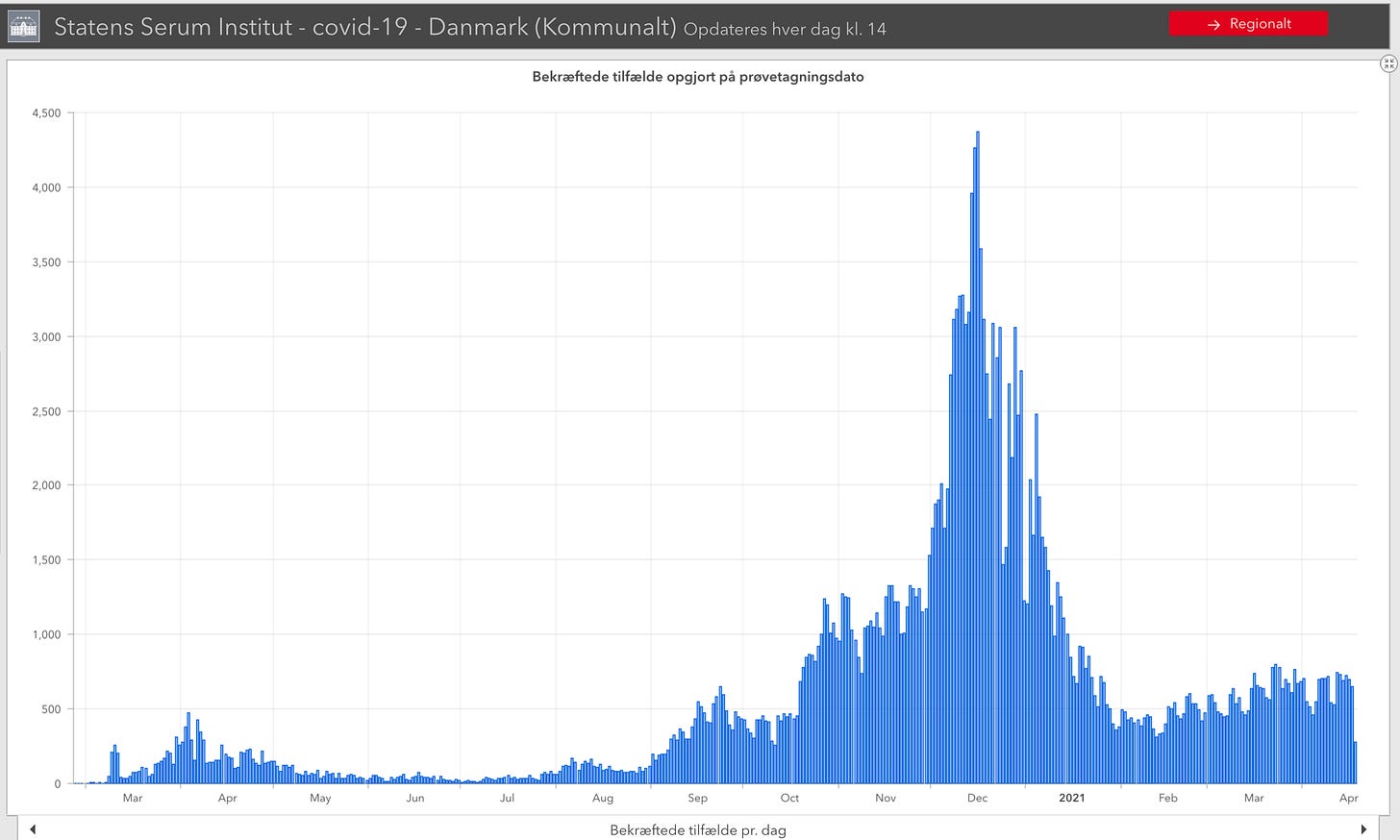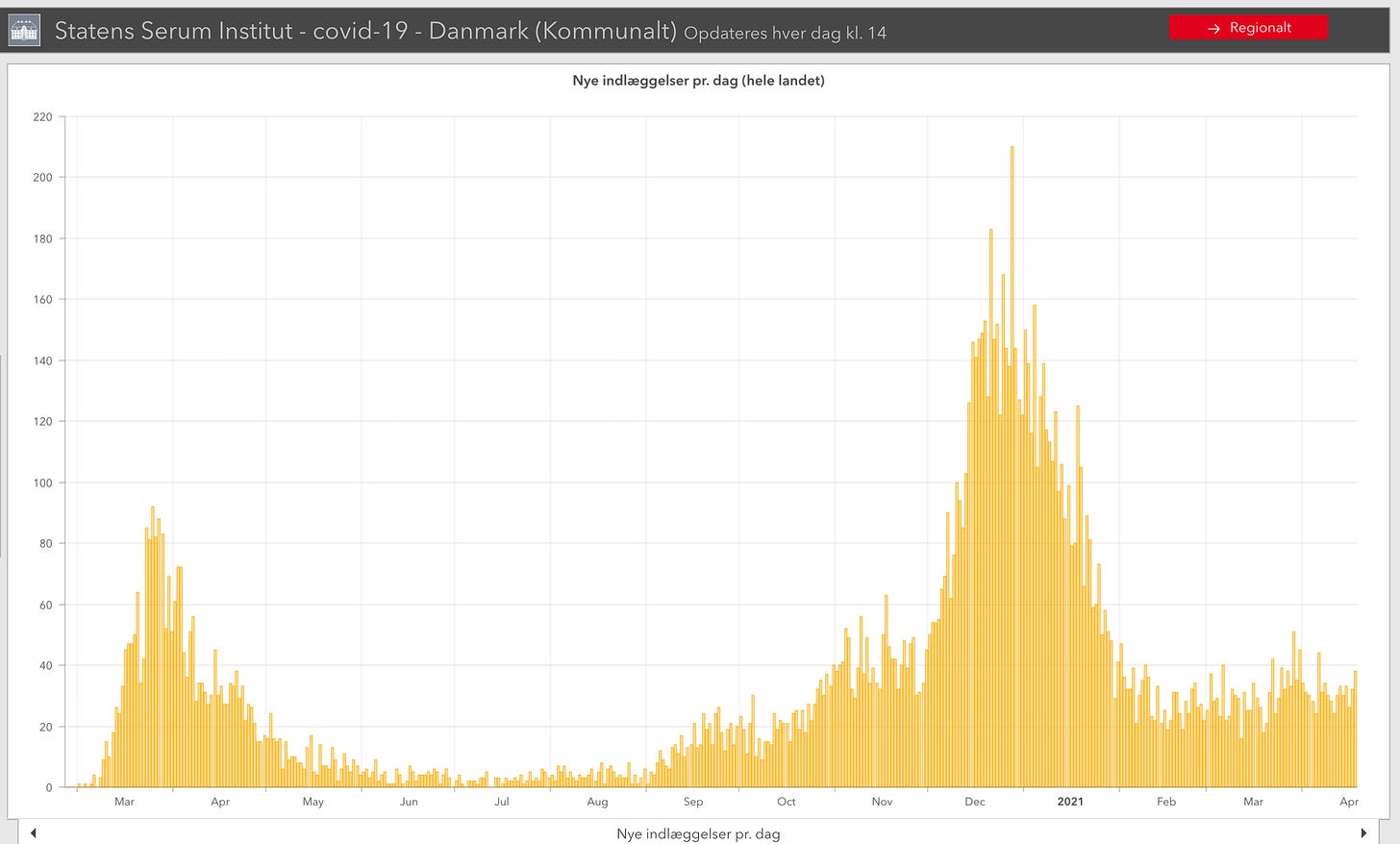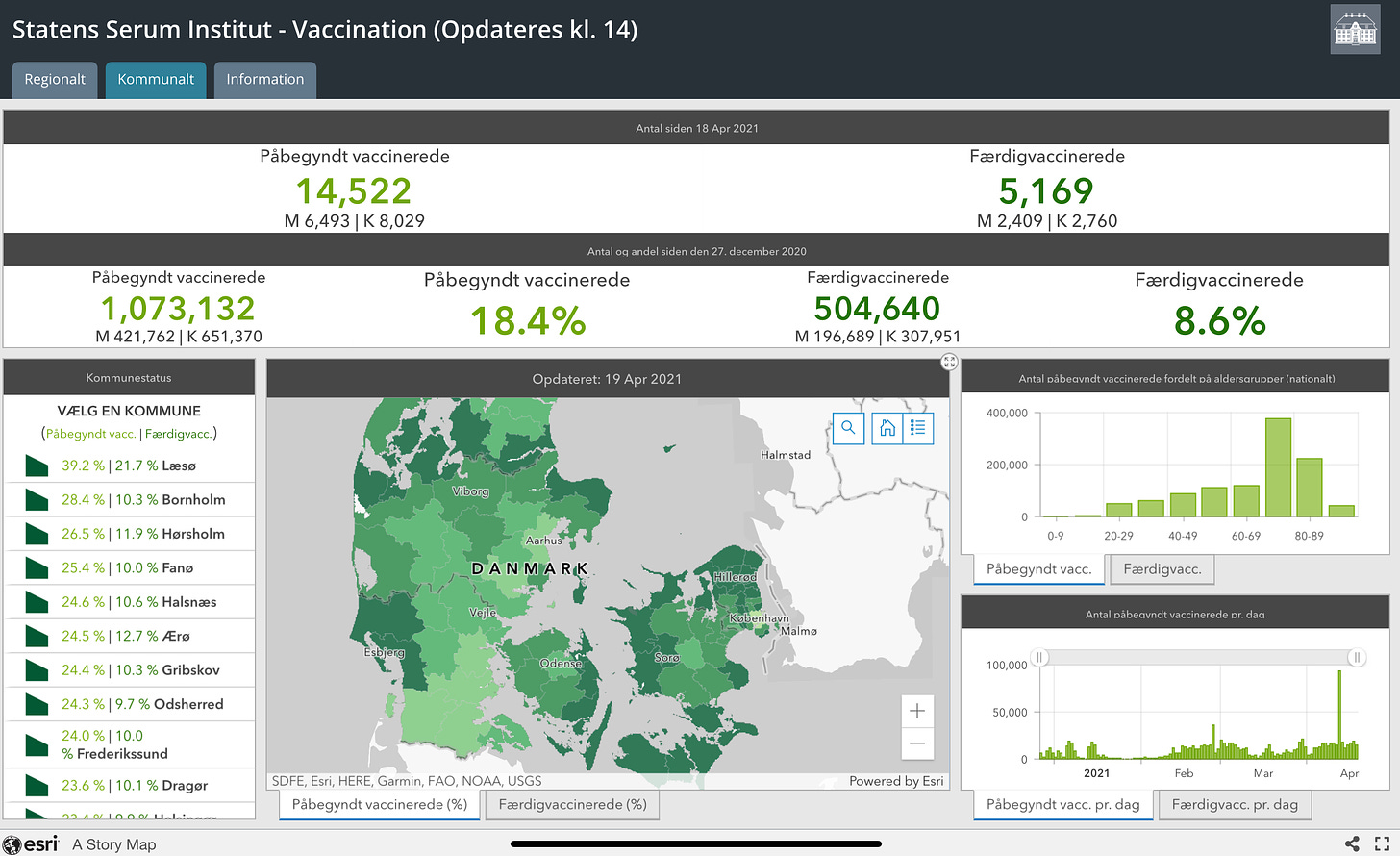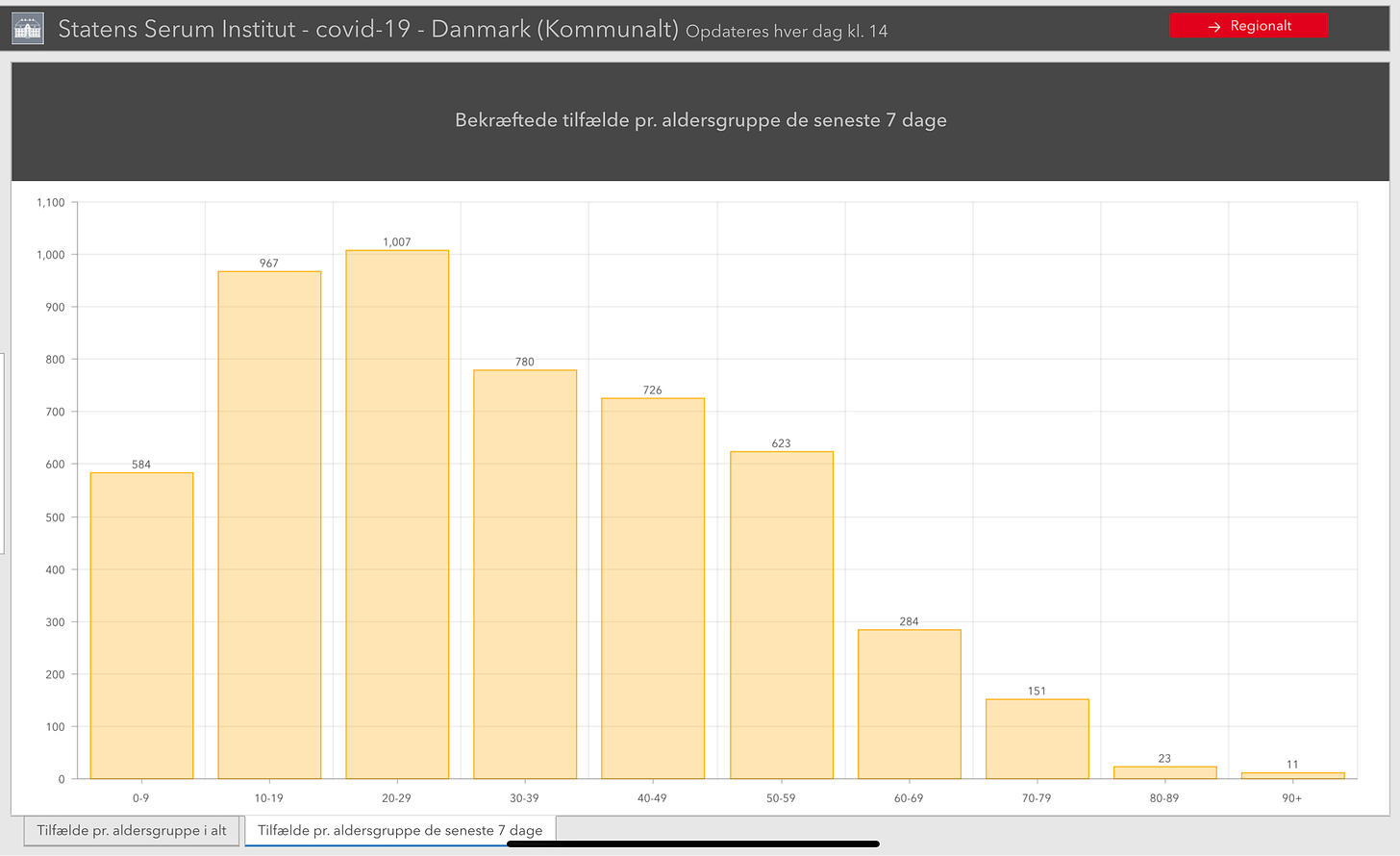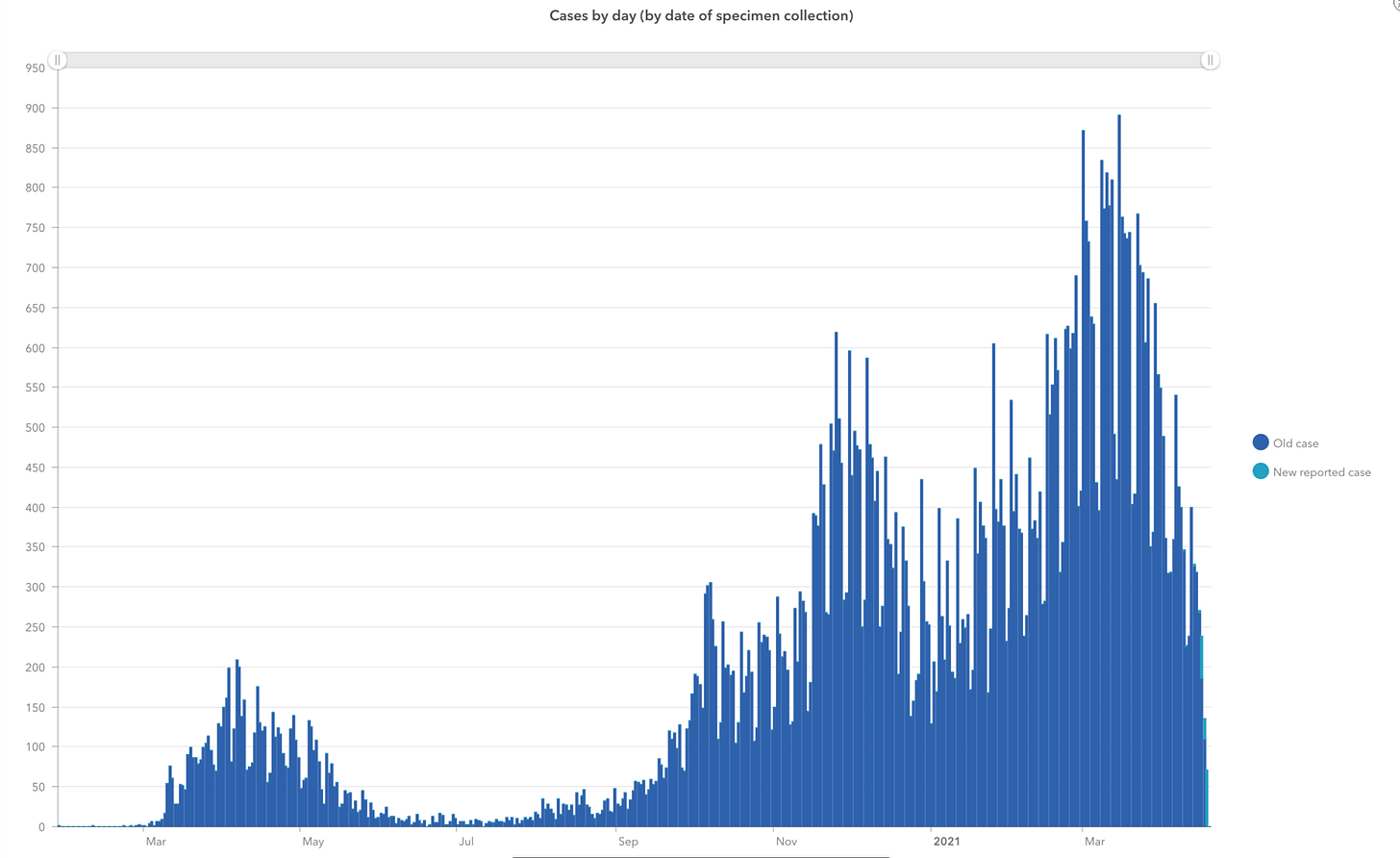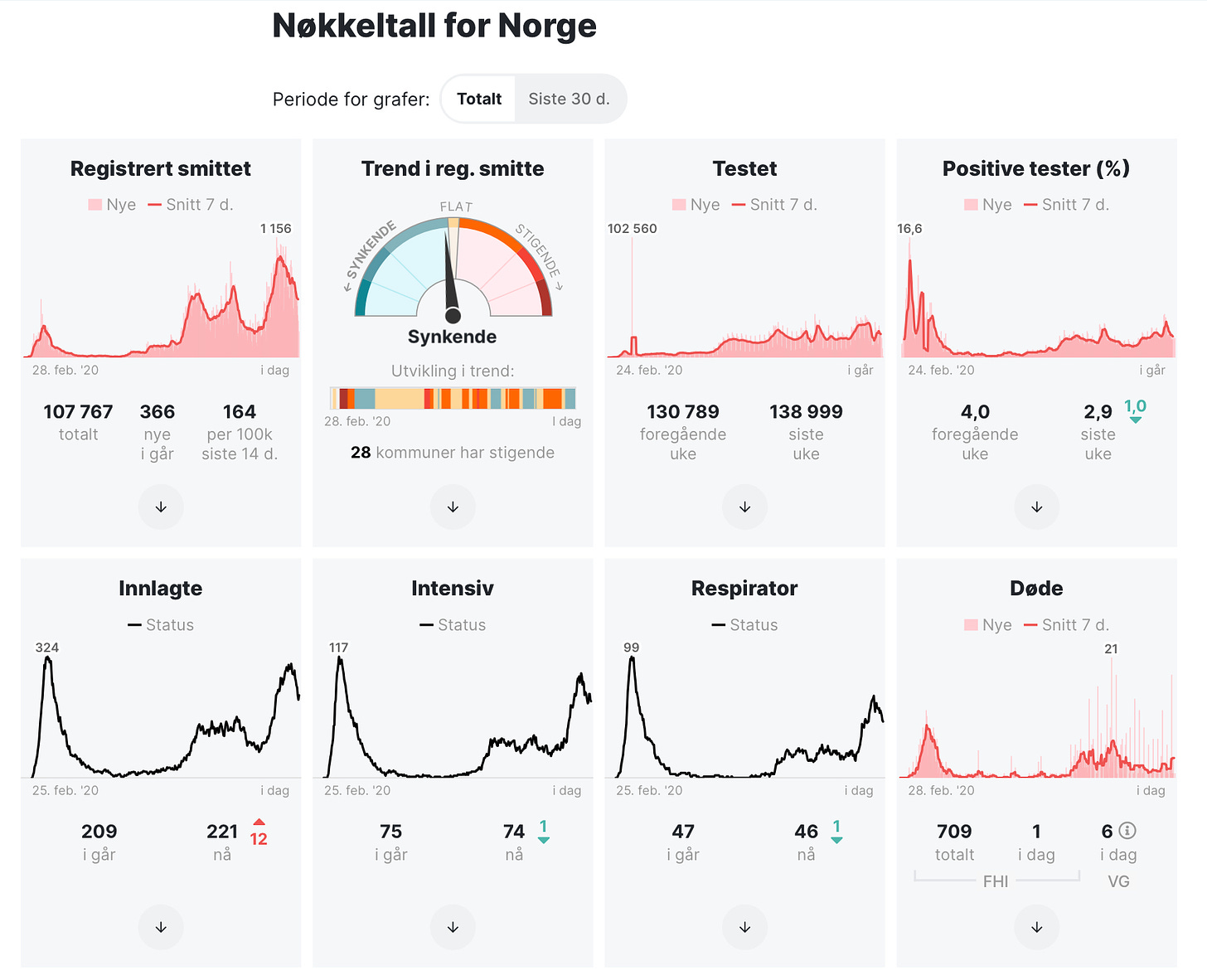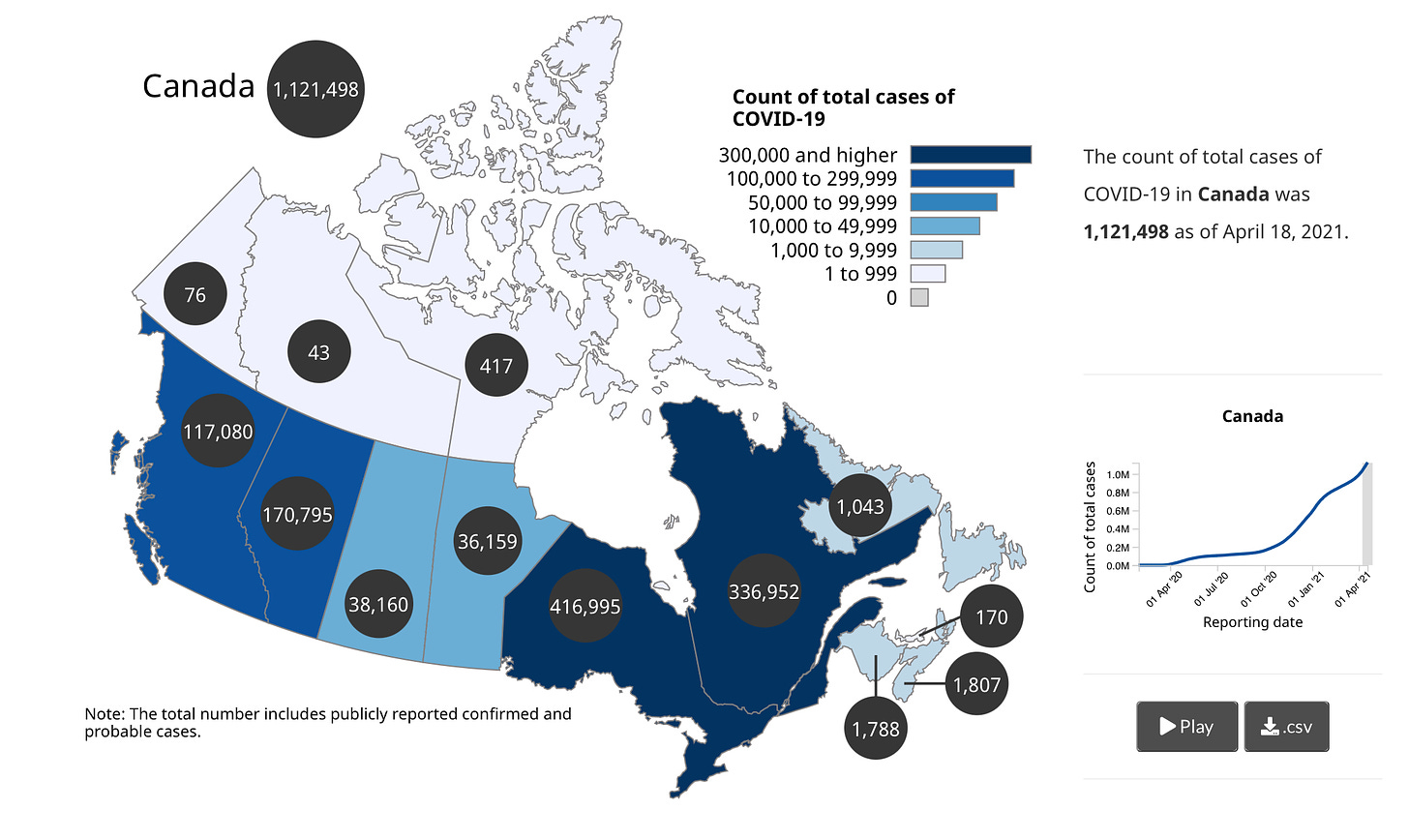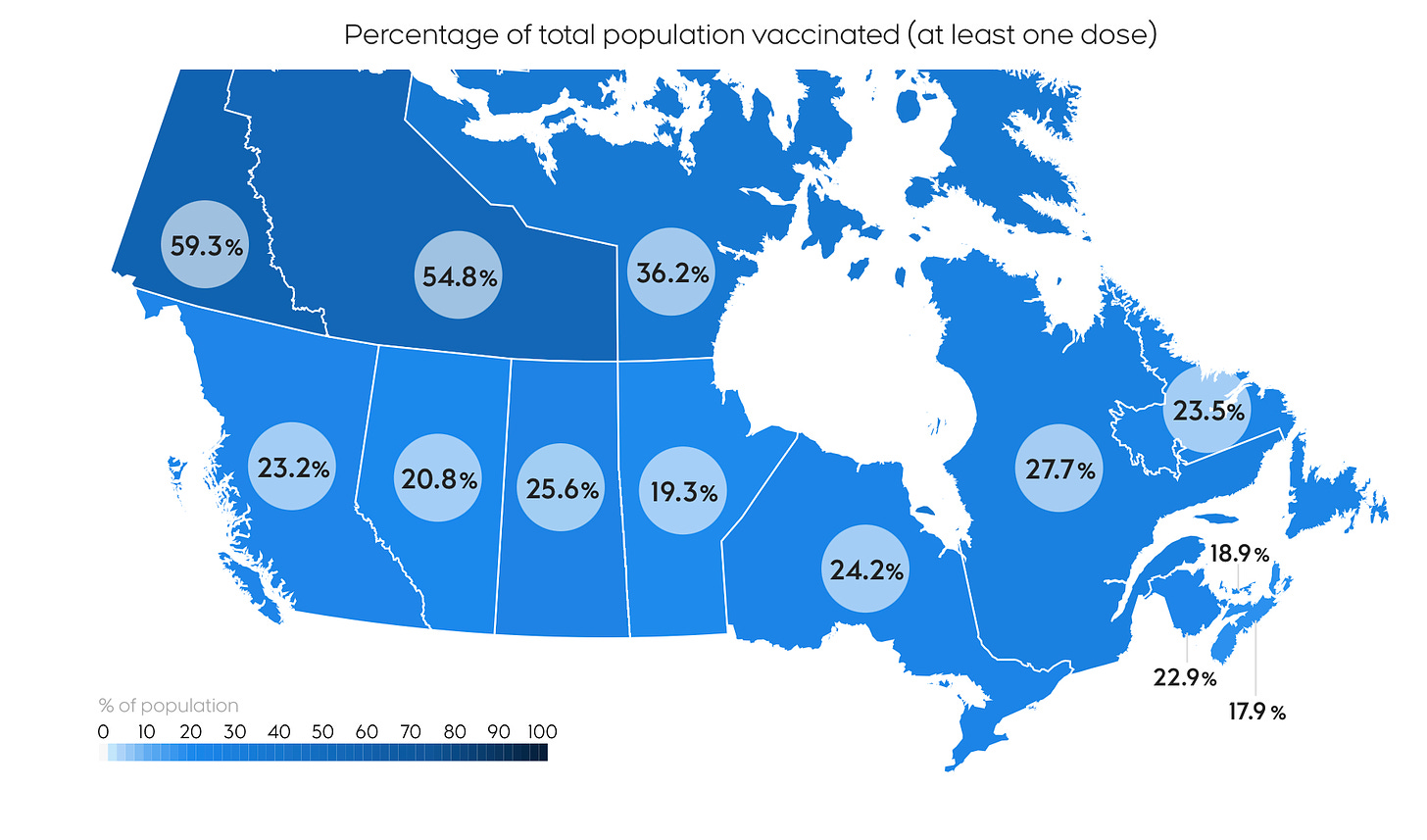The Evening Report - April 19th
Denmark opens the door to tourists from a small list of countries
🇩🇰
As of midnight Tuesday, Denmark officially reverts back to the colour coded travel advisory system, doing away with the blanket ‘red’ zone for all countries. Today Foreign Affairs Denmark revealed most of the world will change from ‘red’ to ‘orange.’
The following countries, however, will remain designated as ‘red’ zones where travel is highly discouraged and strict travel restrictions remain in place for incoming travelers. They are - Bangladesh, Botswana, Brazil, Eswatini, Lesotho, Malawi, Mozambique, South Africa, Zambia, Zimbabwe, as well as the La Réunion region, an overseas French territory off south-eastern Africa.
Noticeable by its absence on the ‘red’ zone list is India, which is curious given its current explosion of coronavirus infections and emerging variants of concern.
All other countries are designated as ‘orange’ meaning all unnecessary travel is not recommended.
As of April 21st, Denmark is removing the requirement for mandatory isolation and a recognizable purpose for entry for people coming from Iceland, and the Norwegian regions of Nordland, Trøndelag, Troms, and Finnmark.
Norway and Iceland will remain rated as ‘orange’ countries due to “significant entry restrictions in the above countries/regions for travelers from Denmark.”
Outside the E.U. and Schengen countries, Denmark is also opening for international travelers from Australia, New Zealand, Singapore, South Korea, and Thailand.
Again Denmark will continue to classify the above countries as orange.
The colour coded COVID risk designations will be reassessed every week or two.
-
DR has a memorandum from the Danish Health and Medicines Authority saying family doctors will be allowed to prescribe the AstraZeneca vaccine to those who want it. According to the memo, the vaccine can be prescribed by all doctors and it will be the doctor's responsibility to weigh the benefits against any possible risks. The note says it will take “several weeks” before this will become official.
Last week Denmark abandoned the AstraZeneca vaccine saying the risk of rare side effects were too great and the country’s overall infection and vaccination status was such that the vaccine wasn’t needed.
-
Denmark is reporting 741 COVID infections and four more coronavirus deaths in the last day.
Yesterday there were 380,766 total corona tests done, 157,297 PCR and 223,469 rapid, for a (PCR only) positivity percentage of 0.47%.
COVID hospitalizations (199) have jumped up (+18). The number of patients in an ICU (36) has inched up (+1). Of those, the number on a ventilator (23) has edged down (-1).
-
Denmark’s National Health Board is lifting restrictions on those who are fully vaccinated.
Deputy Director of the National Board of Health, Helene Bilsted Probst, says new studies show a fully vaccinated person presents a very low risk of infecting others with COVID.
“Therefore, we now recommend that you, as a vaccinated person, no longer need to be tested regularly when you do not have symptoms. It will be a great relief for people to no longer have to spend time and energy on being tested, for example, twice a week.”
Bilsted Probst says people who are considered high risk for COVID but who have both vaccine doses can also now return to a more normal life.
“Many people who are at particular risk of COVID have in recent years lived with more precautions than the rest of the population. It has had major consequences for their family life, social relationships, and work. There is no doubt that it is of great importance to them that they can now participate more normally in everyday activities. They no longer have to worry about becoming seriously ill or hospitalized.”
Recommendations for all people who have been vaccinated can:
be with other vaccinated people without social distancing or wearing a mask
be with family or close friends who have not been vaccinated without social distancing or wearing a mask IF family and close friends are not considered a high risk for COVID.
opt out of self-isolation if you have been in 'close contact' to someone who is infected.
fully vaccinated people no longer need to be tested regularly
Recommendations for vaccinated individuals considered at increased COVID risk can:
behave like other vaccinated people and you do not need to take special precautions, eg wearing a mask in private.
participate in activities with others.
use public transit and go shopping, without limitations.
return to work as usual.
be with relatives again especially if those relatives are also fully vaccinated.
-
The Staten Serum Institut says the vaccination effort is “progressing rapidly” with one in every five people over 16 years old in the country now having at least one dose.
SSI Acting Head of Department Palle Valentiner-Branth says uptake among the most recent target group is going well.
“It seems that the 65-74 year-olds also like to be vaccinated, as 96,077 people have already received a first dose. That corresponds to 18%.”
Valentiner-Branth says the first three target groups: nursing home residents, those over 65 receiving home care, and all seniors over 85 are almost completely vaccinated. 92%, 83%, and 91%, respectively, have received both doses.
As for target groups 6, 7 and 8:
“The proportion of people who have started vaccination among relatives of those considered high risk, 80-84-year-olds, and 75-79-year-olds is already up to 64%, 90% and 80% respectively.”
-
On the vaccination effort to date, 1,073,132 1st dose vaccinations (18.4% of the population) have been administered while 504,640 people (8.6%) are now fully vaccinated.
Yesterday 19,691 total vaccinations were administered.
In the last seven days, new infections remain largely concentrated among those under the age of 60 and especially among 10 to 29 year olds. Due to the mass vaccination campaign, new infections continue to happen in very low numbers for everyone over the age of 60.
-
Region Hovedstaden (Metro Copenhagen Health Region) and the Danish Emergency Management Agency are ramping up testing in hard hit Ishøj Kommune.
For nine weeks the Kommune has seen increased levels of COVID testing as part of an intensive strategy to wrestle down infection numbers. Now the two agencies are working together to get testing directly into residential areas with no requirement for an appointment. This will run from April 20th until the 30th.
This is in addition to the large test center at the Kulturium, which has a capacity for 1,000 tests per day. The health region is also working with the Kommune to set up another local pop-up testing site.
Ishøj has a COVID incidence rate of 245 per 100,000 people and remains under lockdown while most of the country sees a continued easing of coronavirus restrictions.
🇫🇮
Finland has registered just 156 infections and another four corona deaths in the last 24 hours. Since Friday’s update it has added 654 infections as its current lockdown seems to be working to drive down the country’s infection curve.
COVID hospitalizations (166) are up (+5), while the number of people in an ICU (34) is unchanged.
On the vaccination effort to date, 1,321,867 1st dose vaccinations (23.7% of the population) have been administered. 122,730 people (2.2%) are now fully vaccinated.
🇳🇴
Norway has added 1,245 infections and two corona deaths since Friday’s update.
COVID hospitalizations (221) are up (+12), while ICU (74) and ventilator numbers (46) slipped down (both -1).
To date 19.69% of Norwegians have one vaccination dose and 5.58% are now fully vaccinated.
🇪🇺💉
Another 100-million doses of the Pfizer/BioNTech vaccine are headed to Europe. In a press release issued today, Pfizer says the E.U. has exercised its option for the additional doses in the purchase agreement signed in February. All 100-million additional vaccine doses will arrive in Europe this year pushing total Pfizer doses for the E.U. up to 600-million.
Pfizer Chair and CEO Albert Bourla:
“To date, we have met all of our supply commitments to the E.U. and we plan to deliver 250 million doses to the European Union in Q2, a four-fold increase on Q1’s agreed quantity.”
🇦🇹
Austria is taking a step back on using Russia’s Sputnik V coronavirus vaccine. Chancellor Sebastian Kurz said today that it will only be used once it is approved by the European Medicines Agency. Austria has been in talks with Russia to procure the vaccine but no official order has been announced.
Hungary remains the only E.U. country to administer the vaccine in spite of it not being approved for use within the E.U. Slovakia also ordered doses but that triggered a political crisis resulting in the Prime Minister resigning.
🇬🇷
The Greek government said today that travelers from within the E.U. and five other countries who are either fully vaccinated or who have a negative COVID test will no longer have to quarantine when they arrive. The negative COVID test must be no more than 72 hours old. The other five countries are the U.K, USA, the United Arab Emirates, Serbia, and Israel.
🇬🇧
In the U.K., Health Minister Matt Hancock said today that the government was working on plans to begin administering COVID vaccine booster shots later this year. Hancock says with evolving variants it is important to stay ahead of the virus.
“We know from our response to other viruses such as flu that we need updated vaccines to tackle mutated viruses. So as we complete the programme for first and second jabs, we're ramping up plans for a booster shot."
-
As of Friday, the United Kingdom will begin refusing entry to people who have travelled from India, or who have been in India in the previous ten days prior to arrival. Only travelers who hold a valid U.K. passport or have residence rights will be allowed to enter the country, but they will have to serve a mandated ten day quarantine in an approved government hotel first. The reason why India has been added to a ‘red list’ is because of the COVID double mutation B.1.617 variant. 103 confirmed infections have already been confirmed in Great Britain.
🇨🇦
Yesterday, Canada reported 7,593 infections while suffering another 32 virus deaths.
On the vaccination front to date, 9,186,735 1st dose vaccinations (24.17% of the population) have been administered while 915,455 people are now fully vaccinated.
Ontario has seen six consecutive days with daily infections above 4,000 according to Health Minister Christine Elliott. She tweeted that “Ontario is reporting 4,447 cases of COVID19 and nearly 42,900 tests completed. Locally, there are 1,299 new cases in Toronto, 926 in Peel, 577 in York Region, 233 in Ottawa and 227 in Hamilton. As of 8:00 p.m. yesterday, 3,904,778 doses of the COVID-19 vaccine have been administered.” There were another 19 deaths. Checkpoints are now posted at interprovincial border crossings in Ontario as the Ford government desperately tries to curb infection numbers.
Quebec has reported 1,092 infections and another 15 corona deaths.
In Atlantic Canada, Newfoundland and Labrador registered three infections. Nova Scotia and New Brunswick have yet to report.
There were 170 infections and one more death in Manitoba yesterday.
Saskatchewan had 289 infections and one more death.
Alberta registered 1,486 infections and another three corona deaths yesterday. Provincial health officials have also confirmed a man in his 60s was diagnosed with blood clotting after receiving an AstraZeneca vaccination. This is the second such case in Canada. The man is recovering.
B.C. doesn’t report on weekends and will update three days worth of COVID statistics later today.




